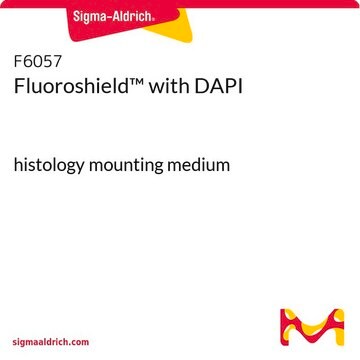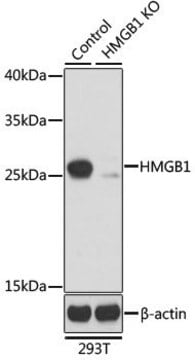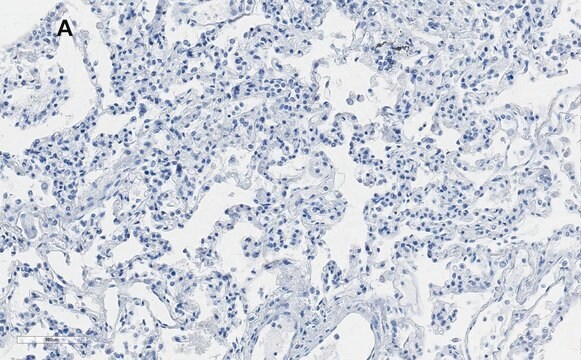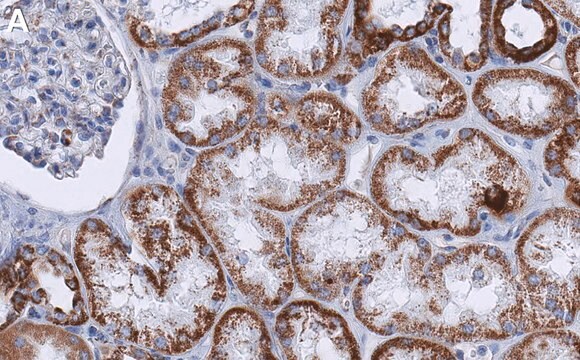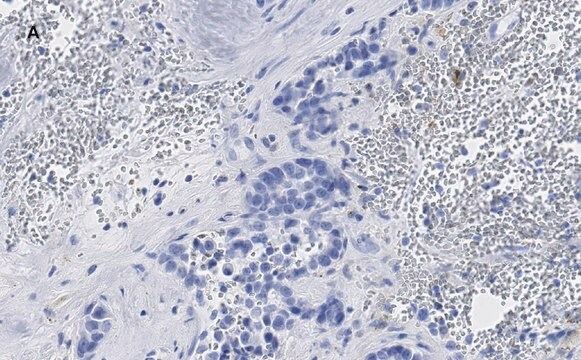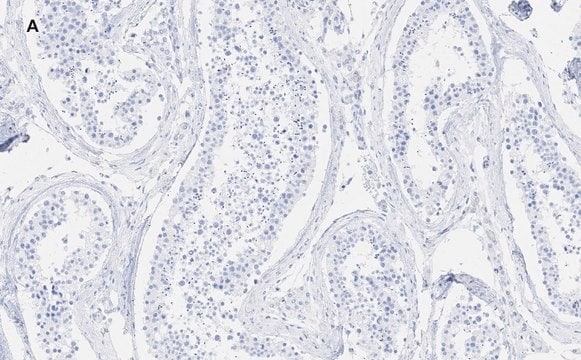General description
We are committed to bringing you greener alternative products, which adhere to one or more of The 12 Principles of Green Chemistry.This antibody is Preservative-free, produced without the harm or sacrifice of animals and exceptionally stable to allow for ambient shipping and storage if needed and thus aligns with "Waste Prevention", "Designing Safer Chemicals" and "Design for Energy Efficiency".
Click here for more information.
ZooMAb antibodies represent an entirely new generation of recombinant monoclonal antibodies.
Each ZooMAb antibody is manufactured using our proprietary recombinant expression system, purified to homogeneity, and precisely dispensed to produce robust and highly reproducible lot-to-lot consistency. Only top-performing clones are released for use by researchers. Each antibody is validated for high specificity and affinity across multiple applications, including its most commonly used application. ZooMAb antibodies are reliably available and ready to ship when you need them.
Learn more about ZooMAb here.Specificity
Clone 3K6 is a ZooMab rabbit recombinant monoclonal antibody that specifically detects High mobility group protein B1. It targets an epitope with in 13 amino acids from the C-terminal half.
Immunogen
KLH-conjugated linear peptide corresponding to 13 amino acids from the C-terminal half of human High mobility group protein B1.
Application
Anti-HMGB1, clone 3K6, ZooMAb, Cat. No. ZRB1002, is a recombinant Rabbit Monoclonal Antibody that specifically targets High mobility group protein B1 and has been tested for use in Immunocytochemistry, Immunohistochemistry (Paraffin), and Western Blotting.
Immunohistochemistry (Paraffin) Analysis: A 1:100 dilution from a representative lot detected HMGB1 in human kidney and mouse spleen tissue sections.
Immunocytochemistry Analysis: A 1:100 dilution from a representative lot detected HMGB1 in HUVEC HeLa, A431, and NIH 3T3 cells.
Target description
High mobility group protein B1 (UniProt: P09429; also known as High mobility group protein 1, HMG-1) is encoded by the HMGB1 (also known as HMG1) gene (Gene ID: 3146) in human. HMG-1 is a ubiquitously distributed, multifunctional redox sensitive protein with various roles in different cellular compartments. In basal state predominantly nuclear. It shuttles between the cytoplasm and the nucleus. Translocates from the nucleus to the cytoplasm upon autophagy stimulation. In the nucleus, as one of the major chromatin-associated non-histone proteins, it acts as a DNA chaperone involved in replication, transcription, chromatin remodeling, V(D)J recombination, DNA repair, and genome stability. It promotes host inflammatory response to sterile and infectious signals and is involved in the coordination and integration of innate and adaptive immune responses. Its HMG box 1 and 2 regions are localized to amino acids 9-79 and 95-163, respectively. HMG box 2 is reported to mediate proinflammatory cytokine-stimulating activity and binding to TLR4. In the cytoplasm it dissociates the BECN1:BCL2 complex via competitive interaction with BECN1 leading to autophagy activation. It is also involved in oxidative stress-mediated autophagy. In its cytoplasmic role it also functions as sensor and/or chaperone for immunogenic nucleic acids implicating the activation of TLR9-mediated immune responses. It serves as a danger associated molecular pattern (DAMP) molecule that amplifies immune responses during tissue injury. In the extracellular compartment it is involved in regulation of the inflammatory response. It Induces the migration of monocyte-derived immature dendritic cells and regulates adhesive and migratory functions of neutrophils. HMG-1 is reported to contribute to the pathogenesis of various chronic inflammatory and autoimmune diseases, and cancer. High serum levels are reported in several inflammatory events including sepsis, rheumatoid arthritis, artherosclerosis chronic kidney disease, and systemic lupus erythematosus. This ZooMAb recombinant monoclonal antibody, generated by our propriety technology, offers significantly enhanced specificity, affinity, reproducibility, and stability over conventional monoclonals.
Physical form
Purified recombinant rabbit monoclonal antibody IgG, lyophilized in PBS with 5% Trehalose, normal appearance a coarse or translucent resin. Contains no biocide or preservatives, such as azide, or any animal by-products. Larger pack sizes provided as multiples of 25 μL.
Reconstitution
Reconstitute lyophilized antibody pellet with 25μL of ultrapure water or Phosphate Buffered Saline (PBS). Please refer to our
reconstitution protocol and the specific application guidance on the suggested starting dilutions and sample type.
Storage and Stability
Recommend storage of lyophilized product at 2-8°C; Before reconstitution, micro-centrifuge vials briefly to spin down material to bottom of the vial; Reconstitute each vial by adding 25 μL of filtered lab grade water or PBS; Reconstituted antibodies can be stored at 2-8°C, or -20°C for long term storage. Avoid repeated freeze-thaws.
Legal Information
ZooMAb is a registered trademark of Merck KGaA, Darmstadt, Germany
Disclaimer
Unless otherwise stated in our catalog or other company documentation accompanying the product(s), our products are intended for research use only and are not to be used for any other purpose, which includes but is not limited to, unauthorized commercial uses, in vitro diagnostic uses, ex vivo or in vivo therapeutic uses or any type of consumption or application to humans or animals.




